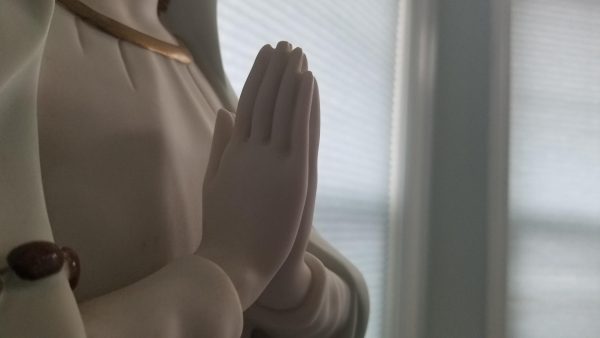Lessons to be learned from a non-religious Lent
February 25, 2009
Upon the completion of 13 years of Catholic schooling, I had more appreciation for spirituality and less for organized religion. The central ideas of Catholicism and most other religions can be extended to one’s personal beliefs about life and nature.
There is no denying the Bible is a collection of stories that have influenced our civilization more than most literary classics. The rituals and traditions people have created based on the Bible may not jive with my understanding of “God,” but like any literary classic, meanings and ideas of the text can be interpreted and used for growth.
Unfortunately, my skepticism of Catholic practices makes me feel unwelcome in church at times, even though I could gladly sit in on the Liturgy of the Word and enjoy it like a philosophy or English class.
The desire to grow personally is universal, and the absorption of various traditionally “religious” practices helps this growth.
For example, today is Ash Wednesday, the beginning of Lent. No matter how one aligns him or herself – atheist, agnostic, Wiccaan, Buddhist, confused, unaffiliated, whatever – the concept of the next 40 days can be incorporated into daily living.
Traditionally, Lent is a time of prayer, charity, sacrifice and repentance that prepares believers for the death and resurrection of Jesus. In my mind, Lent is a time of reflection, good deeds and practicing my vices in moderation in preparation for the coming of a better self.
Lent doesn’t have to be a strictly religious practice. It would be ideal for people to not need an excuse to have a period of reflection or sacrifice. These next 40 days can be utilized even for the non-religous.
The traditions of Ash Wednesday and Lent don’t have to be reserved only for those who will go to mass and give up meat on Fridays. Through textual analyzing with relativity in mind, it can be applied to anyone who wishes to reflect.
When ashes are put in a cross on a person’s head, one of three phrases is uttered. The first, from Genesis, is easily applicable: “Remember, oh man, that you are dust and to dust you shall return.” It is a reminder that we are floating around this universe together and are part of something (even if just science) that is greater than us.
Secondly, from the Gospel of Mark, is: “Turn away from sin, and be faithful to the Gospel.” It doesn’t have to be interpreted in regard to traditional views of sin or the Gospel; rather, it is a call to make an effort to act with goodness and love.
The third is the simple phrase from the Gospel of Mark: “Repent, and hear the good news.” I interpret this as taking time to reflect on one’s wrongdoings and to know good news can be on the horizon. This good news could even be as loose as knowing one can create good news for him or herself by being good to the body or mind or making someone else feel better.
On a completely practical level, it takes 20 to 30 days on average to make something a habit. Habit-building (or habit-losing) while others are doing it as well can only make it easier.
Brenna McNamara is a junior philosophy major and columnist for the Daily Kent Stater. Contact her at [email protected].
























